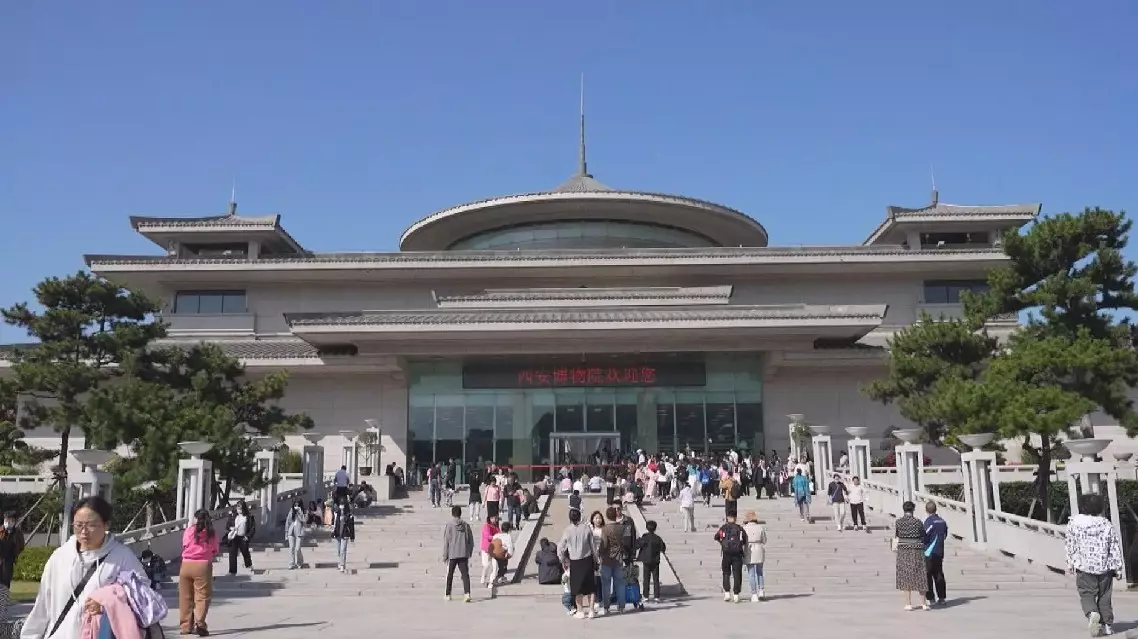Museums and cultural relic sites across China have received over 60 million visits during the country's week-long National Day holiday, which started on Tuesday, hitting a historic high, according to the National Cultural Heritage Administration.
Over 90 percent of museums have temporarily canceled reservation requirements to maximize their efforts in fulfilling the viewing demands of visitors.
Many museums have also launched a variety of new exhibitions and innovative activities. The Shanghai Museum prepared a grand exhibition on ancient Egypt, drawing enthusiasts ancient history from across the country.
"I come from Kunshan [in east China's Jiangsu Province]. I always think that the Egyptian artifacts are very mysterious, as if they hold many enigmas, so here I am trying to learn more," said a visitor.
"We hope to create more and better exhibitions and cultural products in the future, engage in more beneficial explorations, and continuously enhance visitors' cultural experiences in the museum," said Chu Xiaobo, director of the Shanghai Museum.
The National Day holiday, also known as "golden week," is usually one of the peak travel seasons on China's domestic tourism calendar.

Chinese museums, cultural relic sites see 60 million visits during National Day holiday
Macao has been emerging as a global hub for conventions and exhibitions in recent years by exploring the enormous opportunities in the sector, driving the region to advance its economic diversification and embrace a brighter future.
Macao has received many awards this year, such as the Best Convention City (Asia) and the Best BT-MICE City, showcasing the recognition for and influence of Macao's exhibition industry.
More than 1,000 electronic game enthusiasts from all over the world gathered recently in Macao to participate in a esports themed event.
Su Zhili, organizer of the event, said that Macao's rich experience in hosting large-scale events, coupled with its good infrastructure, has driven him to choose the region as an ideal destination to hold such an activity.
"Macao has held many similar large-scale events. It has rich experience, and the facilities at the venue are relatively mature, so we can start our work comfortably," said Su.
During the first three quarters of 2024, Macao held more than 1,000 conferences and exhibitions in total.
"We will invite more professional, special conferences to be held in Macao and also cultivate more exhibition brands with international influence in Macao, so as to promote Macao's exhibitions to be more market-oriented, professional, international, digital and greener from various aspects. This is our goal," said Elaine Wong, member of the Macao Commerce and Investment Promotion Institute.
In addition, multiple large exhibitions and conferences, such as the Macao International Trade and Investment fair, the Macao Franchise Expo, and the International Infrastructure Investment and Construction Forum, are held regularly in Macao.
With the introduction of a series of policies and measures to facilitate the exchanges between the mainland and Macao, as well as the construction and development of the Guangdong-Hong Kong-Macao Greater Bay Area and the Guangdong-Macao In-Depth Cooperation Zone in Hengqin, Macao's convention and exhibition industry will embrace more opportunities for development in the foreseeable future.
"We have such a good industrial base in the Greater Bay Area. The mode of 'Convention and Exhibition + Industry' not only integrates the industries of Macao, but also the industries of the Greater Bay Area. In addition, Macao actively integrates into the national development and plays a role in the Belt and Road. Why are we so confident in Macao's convention and exhibition sector? Because it is backed by the motherland, and the country gives Macao great support," said Alan Ho, chairman of the Macao Association of Convention, Exhibition and Tourism Sectors.

Macao emerges as global hub for conventions and exhibitions, driving economic diversification and international recognition










